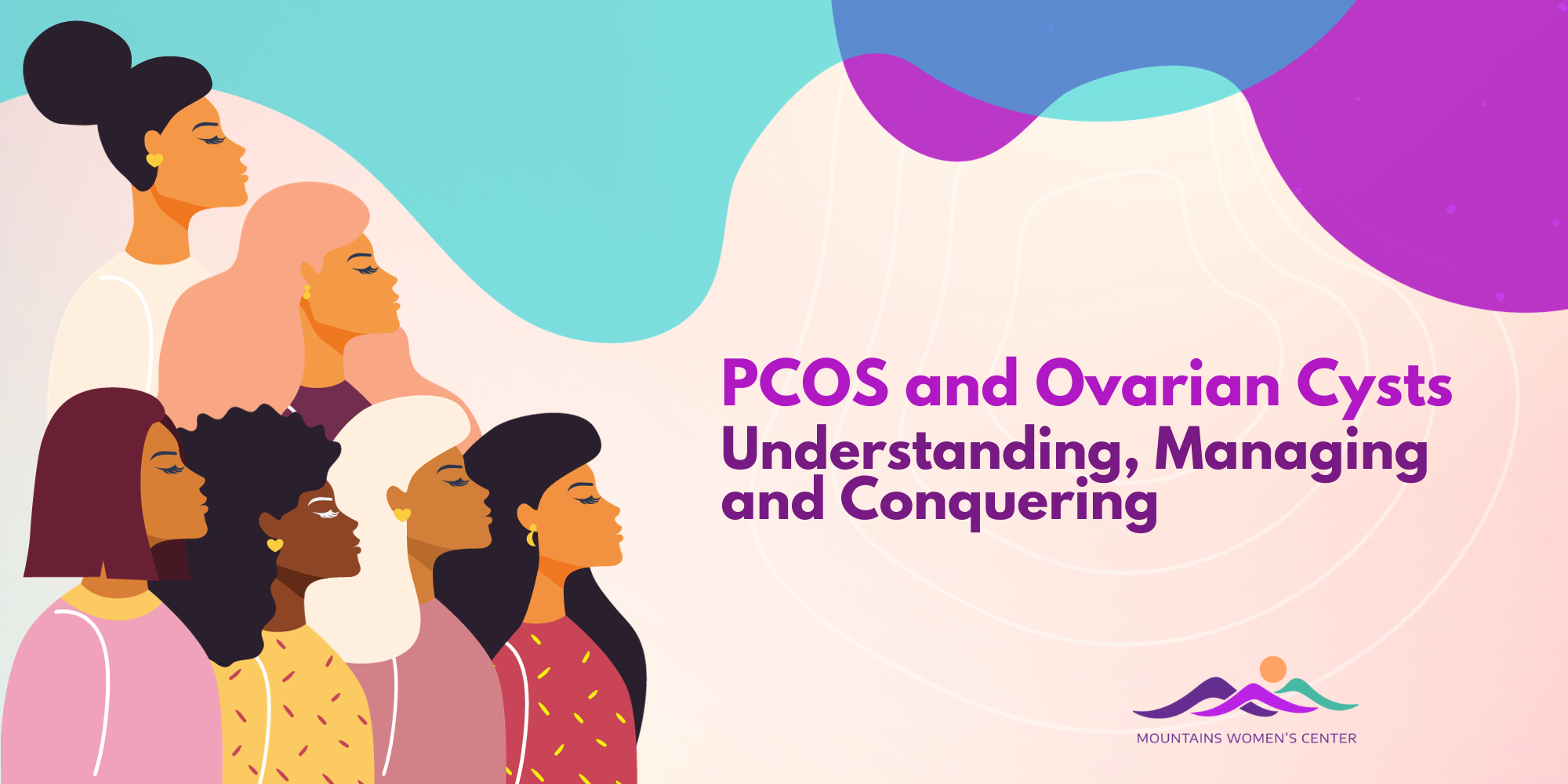Polycystic Ovarian Syndrome (PCOS) and Ovarian Cysts are common gynecological conditions that affect many women worldwide. The symptoms of Ovarian Cysts and PCOS can manifest in various ways. Women with PCOS may experience symptoms ranging from discomfort and irregular periods to disruptions in hormonal balance. PCOS is a common condition, but the exact cause is unknown. It is important to note that there is a difference between ovarian cysts and PCOS. Ovarian cysts are fluid-filled sacs. If you have or suspect that you have PCOS or ovarian cysts, Dr. Amber Glenn, an experienced OBGYN at Mountains Women’s Center, is here to help. Book a consultation to address concerns regarding your menstrual cycle, difficulties with conception, newly developed cysts, or signs of excessive androgen levels.
Causes of PCOS and Ovarian Cysts
PCOS is characterized by irregular menstrual cycles, the presence of multiple small cysts on or within the ovaries, and elevated levels of androgens. Ovarian cysts are fluid-filled sacs that can develop on or within the ovaries. They are often common and cause little or no discomfort. In some cases, ovarian cysts may resolve on their own without treatment within a few months. While most cysts are benign, there is a possibility for them to become twisted or rupture.
Symptoms of Ovarian Cysts vs. Symptoms of PCOS
PCOS and ovarian cysts can cause a wide range of symptoms, which can vary in severity from person to person. If you are experiencing any of the following symptoms associated with PCOS or cysts, it is important to consult a healthcare professional for a thorough evaluation and diagnosis of PCOS. Additionally, it is necessary to check for cysts as they are typically found by chance during a physical examination or imaging.
Symptoms of PCOS:
- Irregular menstrual periods
- Excess facial and body hair growth (hirsutism)
- Acne and oily skin
- Weight gain and challenges in weight management
- Hair thinning or loss on the scalp
- Pelvic pain
Ovarian Cysts Symptoms:
- Pelvic discomfort or pain, often exacerbated during menstruation
- Bloating or a sense of abdominal pressure
- Irregular menstrual cycles
- Painful intercourse
Diagnose PCOS and Ovarian Cysts
Please keep in mind that experiencing any of the mentioned signs and symptoms, such as PCOS or ovarian cysts, does not mean that you have PCOS or ovarian cysts.
If you suspect you have PCOS or ovarian cysts, it is recommended that you schedule a consultation with Dr. Amber Glenn, an experienced OBGYN at Mountains Women’s Center, to receive an accurate diagnosis.
Treatment Options for Types of Ovarian Cysts and Polycystic Ovarian Syndrome
Prioritizing the management of polycystic ovary syndrome (PCOS) and ovarian cysts is crucial. There are several medical interventions to consider, including hormonal therapies, lifestyle adjustments, and targeted medications to alleviate PCOS symptoms. In instances where ovarian cysts are large, cause severe symptoms, or other treatments prove ineffective, surgical interventions may be necessary. These procedures can involve removing follicle cysts, preserving follicles, or, in some cases, partially or completely removing the ovaries to prevent the formation of ovarian cysts.
Treatment for PCOS typically aims to manage the various symptoms and underlying hormonal imbalances associated with the condition as the is no cure for PCOS.
Lifestyle Modifications:
- Dietary Changes: A balanced diet with a focus on lean protein, and healthy fats can help manage insulin levels.
- Regular Exercise: Can improve insulin sensitivity and help with weight management. It can also regulate menstrual cycles.
- Weight Management: For overweight individuals with PCOS, losing even a small amount of weight can significantly improve symptoms.
Medications:
- Oral Contraceptives: Women with PCOS often get prescribed birth control pills to regulate menstrual cycles and reduce androgen levels.
- Metformin: This diabetes medication is sometimes prescribed to improve insulin sensitivity for patients with insulin resistance.
- Fertility Medications: If fertility is a concern, medications like clomiphene may be used to induce ovulation.
Surgery:
- Assisted Reproductive Technologies (ART): For women with PCOS who are struggling with infertility, procedures such as in vitro fertilization (IVF) or intrauterine insemination (IUI) may be recommended.
Many women with Polycystic Ovarian Syndrome (PCOS) and ovarian cysts require ongoing monitoring to assess and manage their symptoms.
Dr. Amber Glenn will work closely with you to develop a personalized treatment strategy that addresses your individual symptoms and concerns if you are diagnosed with PCOS.
Pain Relief Treatment Plan For PCOS and Ovarian Cysts
Effective pain treatment for many women with PCOS and Ovarian Cysts is a critical aspect. Below, we outline pain relief techniques that may prove beneficial for people with PCOS and functional cysts.
- Over-the-Counter Pain Medications.
- Heat Therapy.
- Prescription Medications.
- Complementary Therapies.
Balancing Hormones to Improve Symptoms of Polycystic Ovary Syndrome (PCOS) and Symptoms of Ovarian Cysts
Balancing hormones is important for the management of Polycystic Ovary Syndrome and functional ovarian.
- A healthy weight through diet and exercise can help regulate, balance and improve symptoms.
- Birth control can help regulate periods and reduce symptoms.
- Stress-reduction techniques such as meditation, yoga, and deep breathing exercises can help stabilize hormones.
- Eat a balanced diet rich in whole foods, fiber, and antioxidants to support hormonal health and overall well-being.
- Ensure regular sleep patterns and get enough rest.
Fertility, Ovulation, and Pregnancy For Women with Ovarian Cyst and PCOS
Fertility and pregnancy can be particularly challenging for women with Polycystic ovary syndrome and multiple ovarian cysts.
PCOS can cause irregular periods. This inconsistency in ovulation can make it more challenging to predict the fertile window, making conception less predictable. However, it’s important to note that it’s not a cause of infertility and you can manage PCOS symptoms with the right treatment for PCOS.
For patients with PCOS struggling to conceive, fertility treatments, such as medications to induce ovulation or assisted reproductive technologies can be effective in improving the chances of pregnancy.
Women who have cysts on their ovaries may also experience difficulties with fertility, especially if the cysts grow larger or cause discomfort. In these instances, surgical removal of the cysts may be considered.
While PCOS and cysts can present fertility challenges, advances in medical treatments and reproductive technologies offer hope for individuals who wish to start a family.
If you have concerns about fertility, are planning to become pregnant, or are currently pregnant, contact Dr. Amber Glenn today to address your symptoms and concerns.

